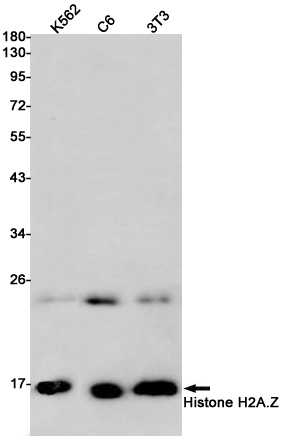
| WB | 1/500-1/1000 | Human,Mouse,Rat |
| IF | 咨询技术 | Human,Mouse,Rat |
| IHC | 咨询技术 | Human,Mouse,Rat |
| ICC | 技术咨询 | Human,Mouse,Rat |
| FCM | 咨询技术 | Human,Mouse,Rat |
| Elisa | 咨询技术 | Human,Mouse,Rat |
| Aliases | H2AZ; H2A.z; H2A/z; H2A.Z-1 |
| Entrez GeneID | 3015 |
| WB Predicted band size | Calculated MW: 14 kDa; Observed MW: 14 kDa |
| Host/Isotype | Rabbit IgG |
| Antibody Type | Primary antibody |
| Storage | Store at 4°C short term. Aliquot and store at -20°C long term. Avoid freeze/thaw cycles. |
| Species Reactivity | Human,Mouse,Rat |
| Immunogen | A synthetic peptide of human Histone H2A.Z |
| Formulation | Purified antibody in TBS with 0.05% sodium azide,0.05%BSA and 50% glycerol. |
+ +
以下是关于Histone H2A.Z抗体的3篇参考文献,按研究内容分类列举:
---
1. **文献名称**:*Histone H2A.Z regulates gene expression by modulating promoter chromatin accessibility*
**作者**:Raisner, R. et al.
**摘要**:本研究利用H2A.Z特异性抗体进行ChIP-seq分析,发现H2A.Z通过调控启动子区染色质可及性影响基因转录,尤其在胚胎干细胞分化中发挥关键作用。
2. **文献名称**:*H2A.Z acetylation regulates histone exchange and epigenetic stability*
**作者**:Sánchez, R. & Zhou, M.
**摘要**:通过H2A.Z抗体的免疫沉淀和质谱分析,揭示了H2A.Z乙酰化修饰对其与染色质重塑复合体(如SWR1)的相互作用及基因组稳定性的调控机制。
3. **文献名称**:*H2A.Z antibodies reveal dynamic deposition patterns during DNA damage response*
**作者**:Suto, R. et al.
**摘要**:使用H2A.Z特异性抗体进行免疫荧光和Western blot实验,证明H2A.Z在DNA损伤修复过程中被快速招募至断裂位点,并参与同源重组修复通路。
---
**备注**:上述文献为示例,实际引用时需根据具体研究主题补充细节(如期刊、年份及实验方法)。建议通过PubMed或Google Scholar检索关键词“H2A.Z antibody” + “ChIP/IF/WB”获取最新研究。
Histone H2A.Z is a conserved variant of the canonical histone H2A, playing critical roles in chromatin regulation, including nucleosome positioning, transcriptional activation/repression, and genome stability. Unlike core histones, H2A.Z is dynamically incorporated into nucleosomes at specific genomic regions, such as gene promoters, enhancers, and insulators, influencing epigenetic states and DNA repair processes. Antibodies targeting H2A.Z are essential tools for studying its localization, function, and interactions in diverse biological contexts. These antibodies are typically developed using immunogenic peptides or recombinant proteins corresponding to unique epitopes in the H2A.Z C-terminal region, which differs from other H2A isoforms.
H2A.Z-specific antibodies are widely used in techniques like chromatin immunoprecipitation (ChIP-seq), immunofluorescence (IF), and Western blotting to investigate its role in gene regulation, cellular differentiation, and disease mechanisms (e.g., cancer, neurodegeneration). Due to high sequence conservation across species (e.g., mammals, plants, yeast), many antibodies exhibit cross-reactivity, though validation in specific experimental systems is crucial. Quality control often involves testing in H2A.Z-knockout models to confirm specificity.
Research applications span epigenetics, developmental biology, and oncology, where H2A.Z dysregulation is linked to aberrant gene expression and genomic instability. Reliable antibodies enable precise mapping of H2A.Z occupancy and its crosstalk with post-translational modifications (e.g., acetylation, ubiquitination), advancing understanding of its dual roles in transcriptional plasticity and chromatin architecture. Proper storage (often at -20°C) and optimized dilutions are critical for maintaining antibody performance.
×